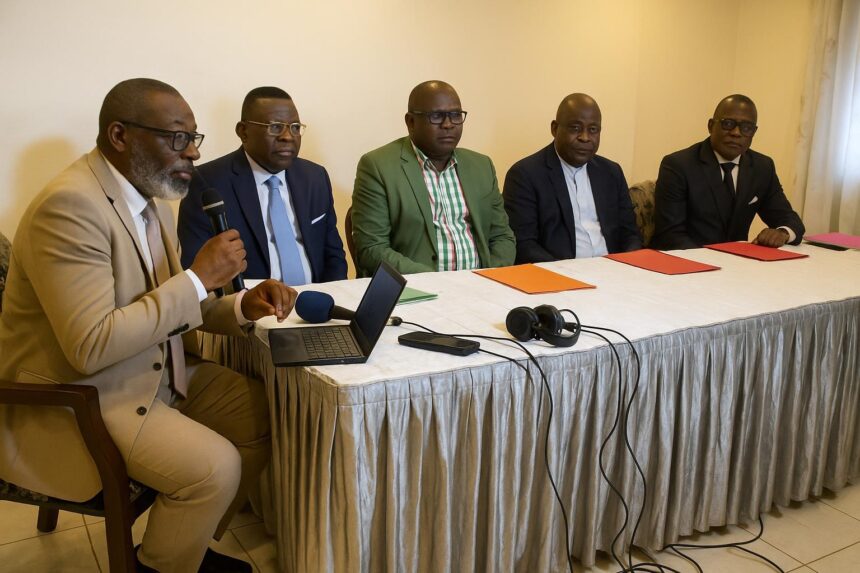Press conference sets the tone
On Saturday 30 September, cameras clicked inside a modest hall in downtown Brazzaville as microphones passed between pastors in crisp suits. They were unveiling the Confederation of Revival Churches of Congo, or CERC, a body they believe can breathe fresh life into a booming spiritual movement.
The short briefing was a teaser before the organisation’s grand public launch scheduled for 3 October at the Palais des Congrès, the capital’s emblematic convention venue that routinely hosts state ceremonies and cultural galas.
Why unity matters for revival churches
“This confederation was born from the shared desire of all revival churches to unite and work together,” CERC president Apostle Germain Ndeke told journalists, his calm voice occasionally drowned by hymns drifting in from an adjacent prayer room.
Revival churches, known locally for energetic preaching and long overnight services, have mushroomed across Congo-Brazzaville in recent years. Yet their growth has also raised questions about accountability, theological training and even noise levels in crowded neighbourhoods.
For Apostle Nzila Ghislain, spokesman of the initiative, the new structure puts “the fathers of the revival churches” back at the centre, granting them authority to vet ministers, enforce discipline and engage state institutions with a single, respected voice.
He listed three core concerns that fuelled the project: unity among believers under one spiritual head, full participation of senior pastors in church life, and an orderly framework that prevents what he called “dangerous drift” in doctrine or practice.
State recognition and nationwide expansion
The state officially recognised CERC on 4 August as a cultural association representing revival churches before the Republic’s institutions. Observers see that stamp of approval as a signal that public authorities welcome more structured dialogue with a movement counting thousands of faithful.
Pastor Chancel Franck Mayinguidi Diamesso, who handles logistics, estimates that CERC already federates hundreds of congregations employing about one thousand pastors. He plans to install coordinators in all fifteen departments, from Kouilou’s coastal villages to the forest communities of Likouala.
“We are not here to compete; we are here to consolidate,” he insisted, adding that independent churches remained free to join later. His team is drafting a charter setting out ethical standards, financial transparency rules and a conflict-resolution mechanism.
Social impact beyond the pulpit
Sociologist Bessy Massamba, who studies religious dynamics in Central Africa, believes the confederation could offer “much-needed self-regulation” while preserving the spontaneity that attracts many urban youths. She notes that similar bodies exist for Catholic, Protestant and Kimbanguist communities.
Faithful such as 26-year-old keyboardist Priscille Samba welcome the initiative. “Sometimes we hear confusing teachings from newcomers. If elders guide us together, the message will stay pure,” she said outside her parish in Makelekele after Sunday rehearsal.
CERC’s temporary office near Avenue de la Paix already buzzes. Volunteers are collating membership forms, while graphic designers finalise a logo featuring an open Bible above the national colours. A short promotional video, cut for social networks, garners hundreds of shares in a few hours.
Beyond administration, leaders stress social impact. They envision literacy classes, health screenings and job-skills workshops run through parish halls, complementing government programmes aimed at youth employability and community resilience.
Official launch agenda in Brazzaville
The upcoming launch ceremony will feature worship choirs, testimonies and messages of encouragement from officials of the Ministry of Territorial Administration, according to the draft agenda shared with the press. Organisers hint at a joint prayer for national cohesion and peaceful local elections.
While CERC assumes leadership among revival churches, existing councils such as the Federation of Evangelical Churches will continue their specific missions. “We intend partnership, not hegemony,” Apostle Ndeke emphasised, noting that dialogue committees are being set up to avoid overlapping events.
From a governance perspective, the confederation will rely on three pillars: a Council of Fathers providing doctrinal guidance, a National Coordination ensuring regional balance, and an Executive Bureau handling daily administration. Elections are promised every four years with term limits for key posts.
Digital future and next steps
If all goes according to plan, by Christmas the majority of revival churches in Congo-Brazzaville could be marching under the same banner, ushering, as Pastor Diamesso smiles, “a new wind of order and hope” into worship tents from Pointe-Noire to Impfondo.
City officials in Brazzaville’s second arrondissement confirm that requests for land to build prayer halls have surged by 60 percent over five years. By facilitating pooled resources, CERC could help congregations negotiate legal leases and ensure buildings meet safety codes, avoiding noisy roadside shacks.
Digital evangelism is another frontier. A small media cell is setting up live-streaming studios so remote worshippers in Diaspora hubs such as Paris or Kinshasa can follow services. The plan includes affordable data packages negotiated with telecom operators to keep online prayer circles accessible.
An inaugural hymn composed for the occasion is already circulating on WhatsApp, humming with anticipation.





















